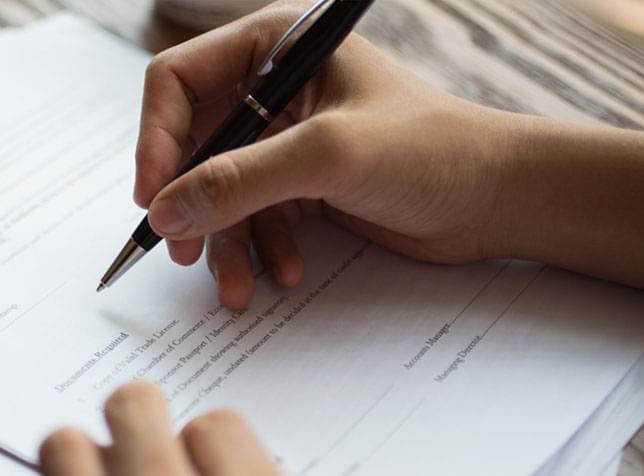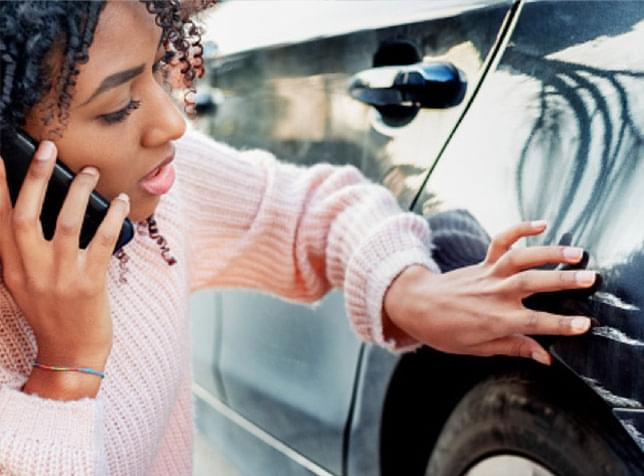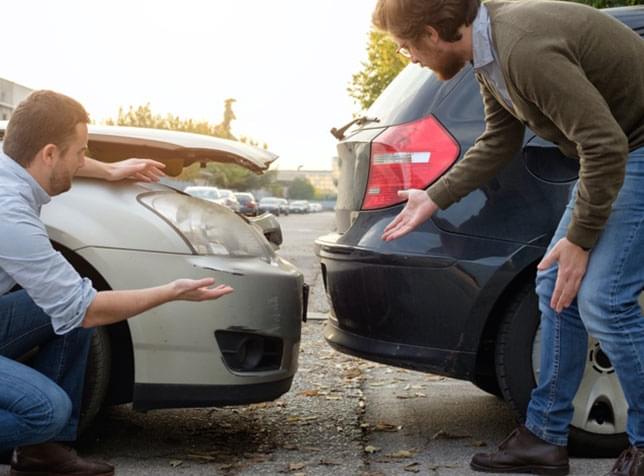
SR-22 Insurance
Need to file an SR-22? You probably have a lot of questions. The good news is The General® will answer them for you and perform the filing in states where they are able to.
Get a free quote today!

SR-22 Insurance Basics
SR‑22 insurance is not actually insurance. It’s a “certificate of insurability” sometimes required for high-risk drivers. SR‑22 filings are also referred to as an SR‑22 bond, SR‑22 certificate, or SR‑22 form, depending on the state.
If you were convicted of a DUI or had your license suspended or revoked, or just had too many tickets in too little time, you might need SR‑22 auto insurance. It’s also usually necessary if you were at fault for an accident when driving without insurance. Without an SR‑22 filing, there’s likely no getting back your driver’s license or registration.
These forms are usually filed by your insurance company to certify that you are carrying the state minimum coverage required for liability insurance. What happens if you cancel your car insurance? The insurance company will let the state know about the canceled coverage right away by filing an SR‑26 form.
SR‑22 insurance is usually necessary for a certain period of time, which varies depending on state laws, as well as the reason for your license suspension or revocation. If you or your insurance company has filed an SR‑22 filing and you cancel your insurance policy, then you should expect revocation of your license and registration. You’ll also go back to square one when it comes to how long you must have an SR‑22 auto insurance filing.

How Non-Owner SR-22 Insurance Differs
Non-owner SR-22 insurance is for people who need to meet their state’s SR-22 requirements but do not own a car. This applies to drivers who frequently borrow a friend or family member’s car or use a rental. A regular SR-22 insurance policy will work if you are leasing or financing a car, as long as you have the necessary amount of insurance required by your loan. If you are living with the person who owns the car you drive, you may not be eligible for non-owner SR-22 insurance.
A non-owner SR-22 insurance policy is much cheaper since the driver is not on the road as often, but it is only considered to be a secondary form of coverage. This means that if someone with a non-owner SR-22 insurance policy damages a borrowed car, the car owner’s insurance will have to pay first. The non-owner policy will cover any additional balances afterwards.
The Difference Between SR-22 vs FR-44
FR-44 insurance is like SR-22 insurance, as it is another way to prove financial responsibility. The biggest difference between the two is that FR-44 insurance policies are only used in Florida and Virginia. Residents of these states must file an SR-22 in addition to an FR-44. The liability coverage with FR-44 insurance is also much higher because they are filed after more serious incidents. SR-22 insurance policies only require drivers to purchase the state minimum, which will vary depending on where you live.
SR-22 Insurance Quotes
Most auto insurance companies don’t deal with SR‑22 filings. It’s a complicated process, and you need a company specializing in SR‑22 filings. At The General, we’ll help high-risk drivers needing an SR‑22 filing and insurance.
At The General, we do our best to provide you with dependable, cheap SR‑22 insurance.
SR‑22 Insurance at The General can help you:
Obtain the right
SR-22 form
Buy an affordable car
insurance policy
Get back behind
the wheel
SR-22 Filing Requirement Lengths
When it comes to how long you must have an SR‑22 insurance filing, much depends on your state’s laws and the seriousness of the offense. Most drivers will need to submit an SR‑22 form for at least three years. Under some circumstances, SR‑22 insurance filings are mandated for 5 years or longer.
Where you live also factors into when the clock starts ticking on your SR‑22 insurance requirement. In some places, SR‑22 starts on the day of the incident, while in others it may begin as of a:
- Conviction date
- License suspension date
- License reinstatement date
Not all states require an SR‑22 filing after a driving offense. Moving to another state when you require an SR‑22 insurance filing means you must file an out-of-state SR‑22. What happens if you live in one of the states using a different system, but must have an SR‑22 insurance filing in another state? In this situation, you must contact the state requiring an SR‑22 filing and provide certification that you are insured for at least the minimum amount of liability coverage required.

Filing an SR-22
Usually, your insurance company handles your SR‑22 auto insurance filing for you. If your insurance company is not licensed in a particular state, you will have to file your SR‑22 form directly with that state’s Department of Motor Vehicles. We’ve provided the contact information for all states below.
At The General, our helpful insurance representatives will guide you through the SR‑22 process and answer any questions you have. We know the SR‑22 laws for each state, and The General ensures that your SR‑22 filing meets state requirements and is filed correctly.
Cost of an SR-22
It varies by state, but you should expect to pay about $25 in fees when filing the SR‑22 form. The General includes the SR‑22 insurance fee with your insurance quote.
Even though SR‑22 fees are typically not that expensive, you will find that your premiums go up. That’s due to the violation for which you are filing an SR‑22. Once you are no longer required to file an SR‑22, and that violation is no longer on your driving record, your insurance costs should go down over time.
Checking Your SR-22 Status
If you want to check the status of your SR‑22 and see if it has expired, you can either call The General Sales and Customer Service line at 1-844-328-0306 or call your local DMV office. Our dedicated customer service representatives are always here to help and answer your questions.
SR-22 Filings from The General
We provide SR‑22 filings in most states. When you contact The General for your free online quote, just let us know you need an SR‑22 insurance filing. We’ll include the SR‑22 insurance form with your policy documents after you apply and buy your car insurance policy online. In just minutes, you’ll have your SR‑22 form available.
** Please note that The General can only file an SR‑22 in the state where your auto insurance policy has been issued.
SR-22 Contact Information
The General - Sales and Customer Service 1-844-328-0306
Find your state below:
Alabama Motor Vehicle Division
Alaska Division of Motor Vehicles
Arizona Department of Transportation
Arkansas Office of Motor Vehicle
California Department of Motor Vehicles
Colorado Division of Motor Vehicles
Connecticut Department of Motor Vehicles
-
Within Hartford area and outside Connecticut
(860) 263-5700
- Elsewhere in Connecticut
(800) 842-8222
Delaware Division of Motor Vehicles
Florida Department of Highway Safety and Motor Vehicles
Georgia Department of Motor Vehicle Safety
Idaho Transportation Department
Illinois Department of Driver Services
Indiana Bureau of Motor Vehicles
Iowa Department of Transportation
Kansas Driver Control Bureau
Louisiana Office of Motor Vehicles
Maine Bureau of Motor Vehicles
Maryland Department of Transportation
Minnesota Driver & Vehicle Services
Missouri Department of Revenue
Mississippi Department of Public Safety
Montana Vehicle Division
New Hampshire Division of Motor Vehicles
Nebraska Department of Motor Vehicles
Nevada Department of Motor Vehicles
New Mexico Department of Transportation
North Carolina Department of Transportation
North Dakota Motor Vehicle Department
Ohio Bureau of Motor Vehicles
Oklahoma Department of Public Safety
Oregon Department of Motor Vehicles
Pennsylvania Department of Motor Vehicles
Rhode Island Division of Motor Vehicles
South Carolina Department of Motor Vehicles
South Dakota Motor Vehicles Division
Tennessee Department of Safety
Texas Department of Public Safety
Utah Department of Motor Vehicles
Vermont Department of Motor Vehicles
Virginia Department of Motor Vehicles
Washington Department of Licensing
Washington D.C. Department of Motor Vehicles
West Virginia Division of Motor Vehicles
Wisconsin Department of Transportation
Wyoming Department of Transportation
Frequently Asked Questions
Strictly speaking, an SR‑22 isn’t car insurance: It’s a certificate of financial responsibility verifying the driver carries the minimum amount of liability insurance the state requires. It’s usually needed if a driver is convicted of violating certain traffic laws. In most cases, SR‑22 insurance is required for 3 years but may vary based upon the severity of the offense and repeat violations.
That said, not all states require SR‑22 forms. You will be notified by your state Department of Motor Vehicles if you are required to carry SR‑22 insurance.
Your car insurance company may be able to file an SR‑22 form for you. The General specializes in providing coverage for high-risk drivers and we can take care of any SR‑22 auto insurance filing requirements within the state our customers live in. Keep in mind that if you cancel your policy, the insurance company must notify the state that you are no longer insured.
People with certain driving violations on their record need SR‑22 car insurance if the state requires it. These violations include:
- Multiple traffic violations
- Serious traffic offense
- Driving while the license or registration is revoked or suspended
- Driving under the influence conviction
- An at-fault accident in which the driver lacks insurance
Either your state or the court will inform you that SR‑22 insurance is needed. If you don’t comply with filing an SR‑22 form, you could lose your license. Your insurance company will either file the SR‑22 form electronically or send it to the state through the mail.
Some people may think they just won’t drive for the 3-year period mandated by the state and won’t get SR‑22 insurance. This is not possible, because if they ever decide to get their license back, they’ll have to go through the mandatory SR‑22 filing first. Since state law varies, check with your state’s Department of Motor Vehicles for specification on SR‑22 requirements.
An SR‑22 form is a document verifying liability insurance coverage. It is not full insurance coverage, but you can buy full insurance coverage while needing to file an SR‑22. Full insurance coverage involves buying collision and comprehensive insurance along with liability insurance. Collision and comprehensive coverage pays to repair damage to your car if you are involved in an accident or the car is damaged by something other than a collision. Examples include hail, water, or a fallen tree.
The state may require you to buy a particular amount of liability insurance coverage. You must comply with this mandate if you want to drive, even if the amount of insurance is more than you usually purchase. However, it is unlikely the state will require full insurance coverage. If you lease your car or still owe payments on it, the lessor or lender will require you to carry collision and comprehensive coverage.
An SR‑22 certificate shows that you bought at least the minimum amount of liability insurance your state requires. Think of SR‑22 insurance as a monitoring system. Basically, the state is monitoring whether or not drivers convicted of certain traffic offenses are carrying liability insurance. That’s why your insurance company must notify the state right away if you cancel the policy. The state then knows the driver is no longer covered and will move to revoke the individual’s license.
The time in which SR‑22 insurance is required to become active depends on the state. In some states, the date upon which an SR‑22 form is needed starts as of the conviction. In other states, it’s the accident date or date of the driver’s license suspension. A driver may have to wait before filing an SR‑22 form if the state doesn’t require the filing until the license restoration date.
The SR‑22 form is not car insurance. It’s just part of your car insurance filing requirements if you committed a violation. You buy regular car insurance as usual, and the SR‑22 form is filed by your insurance company to the state on your behalf.
You must buy regular car insurance before filing the SR‑22 form. Only an insurance company can provide the SR‑22 form since it’s proof that you have coverage. Without meeting the SR‑22 requirement, you can’t get your license back and start driving again.
When you buy car insurance from The General, the SR‑22 insurance form is included with your policy documents after purchasing your auto insurance policy online. In just a few minutes, you’ll have auto insurance coverage and your SR‑22. Buy car insurance online using our award-winning mobile app. You’ll receive a free auto insurance quote in 2 minutes, and can apply for and buy your policy, complete with SR‑22 form, in about 12 minutes.
Expect to pay an annual filing fee of about $25 for your SR‑22 certificate. The General includes this fee in your insurance quote. When you need an SR‑22 certificate, it isn’t the filing fee that raises your rates—it’s whatever violation caused the SR‑22 filing requirement. On the bright side, when you no longer have that violation on your driving record, your insurance premiums should go down. Insurance companies such as The General will automatically continue with your policy once your SR‑22 car insurance filing requirement is done.
Depending on the offense and the state, quite a bit. Currently, a driver convicted of a DUI can expect to see their premium rise by as much as 375% in North Carolina, and as little as 48% in Indiana. In the majority of states, rates rise between 70 and 80%.
Look for a company providing SR‑22 forms to the state along with affordable car insurance coverage. If you need an SR‑22 filing, you’re considered a high-risk driver, so seek out an insurance company specializing in providing high-risk driver coverage, such as The General.
Because of traffic or proof of insurance violations, expect to pay higher premiums once you have to file an SR‑22 form. You can save money when you need SR‑22 insurance by buying and insuring a used car that doesn’t need collision and comprehensive coverage. However, if the car is not covered by collision and comprehensive coverage, just make sure you can afford to replace the car if an accident happens.
Other ways to save money on your premiums so you benefit from cheap SR‑22 insurance is by opting for a higher deductible. Your monthly rate is lower when you choose a high deductible, but you’ll have to pay more out-of-pocket if you are in an accident.
Drivers who do not own vehicles can get non-owner SR-22 insurance. This policy is recommended for high-risk drivers who frequently borrow a car from someone they do not share an address with. Non-owner SR-22 insurance is typically cheaper since the driver is not on the road as much.







